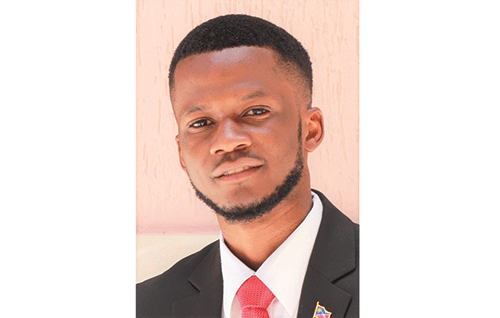Tio Erastus Nakasole
As many political activities are expected to abound in 2024, economic activities should be equally considered and prioritised.
Namibia’s industrialisation path remains one of the great determinants of the country’s future, therefore, cannot be put at the perils of the things which matter least.
Having experienced years of revolt and warfare, we came from a colonial rule, first by Germany and then by South Africa. Thirty-three years after independence, cannot be used as a frame of reference for forging our current economic situation being endured yet brainwashing the individual with the wishful desire for a non-pragmatic vision, non–undergird development plan, and untracked strategic objectives. The question is should we live in the present and blame the past for all the perils and pitfalls or should we live in the presence of high hopes and big dreams about the future that “a manna will fall from heaven”, that will make the countries realise it is prosperity.
Radical change
Mahatma Gandhi once reaffirmed that, “be the change you want to see in the world.”
In modern days, nations are characterised by high policy-making organs, which chart the course of strategic objective in overhauling their economic status.
Namibia ratified the treaty of the African Union, United Nations, Common Wealth of Nations, SACU, and SADC. As a unitary State, Namibia is not an exception from that. Depending on which side the economic head or tail wind is blowing from, it is imperative to realise our economic potential at the onset with a suitable mechanism that seek to gravitate us towards prosperity. Are we winning, are we losing, or we are being used?
Inequality trap
As per saying “United we stand, divided we fall”, things such as corruption increases income inequality and poverty through lower economic growth, biased tax system in favour of those already have and well connected, poor targeting of social programmes, use of wealth by the well to do to lobby government for certain policies allow inequality to permeate in asset ownership, lower social spending and place the poor at stake in investment decision.
As far as the World Bank listing Gini coefficient barometer is concerned, Namibia is ranked as one of the world’s most unequal countries seconded by South Africa. The establishment of ACC and other watchdogs seems to be politicised and overserved due to their heads overserving on positions of high authority for too long. This weakens the legitimacy and credibility of such institutions. Recently, the establishment of public interviews for judges builds trust.
However, when the system and opportunities are congested, scarce, and heavily demanded - one rejoices or benefits through unethical means. This disparity continues to haunt Namibia, both in terms of economic opportunities and access to services, keeping an expansion on the poverty line and oppressing the poor.
Econometrically, there is a direct correlation between income inequality, corruption, and poverty and its existence is a burning issue for a young nation such as Namibia that seeks to become prosperous as it endangers the relative homogeneity of the entire population country.
The only ladder available to step out of this is by having strong anti- corruption commissions, educating ordinary people from having to depend upon corrupt leaders for their livelihood, and universal public education that seek to meet the market demand with (unchastised priority and non-priority course).
Countries such as Singapore, Hong Kong, and Botswana conquered the above because they have never allowed corruption, nepotism, favouritism, or cronyism to become part of their national vocabularies but know them as a foreign language.
Emancipation
One must understand that winning a battle alone does not guarantee winning the war. It is with high note that, the heroes and heroines who fought day and night to free this beautiful landscape nation are acknowledged and their relentless effort should never be written off but documented.
In tandem, I fully conquered with Kefas Sheehama who once said in his writing that “Leaving no one behind should not be a number game or symbol of pleasing the poor rhetorically, but one that calls for re-evaluation and reimagining what independence means and provides.”
However, contemporary, this nation should be forward-thinking and emancipate itself from the past colonial turmoil of apartheid and inequality. A nation should eye and live in the fourth industrialisation, by taking advantage of the power of knowledge in the young people, ruthlessness in pursuit of excellence in a high institution that are the custodian of economic growth, empowering and strategise SMMEs in becoming the incubators of the entrepreneurs and driving force of uplifting State coffers and not a last resort of State handout, accommodated transformation multinational to eye mark and track it’s culmination annually the performance of the decentralisation policy on local authorities, this will curb urbanisation which breeds skewed development, abolish and re-direct “drop an ocean kind of ministries” that have intertwined duties into a State revenue generating entities where graduate youth should be at the helm, in economics, this is not just an investment for the future but keeping money in circulation will solve internal affairs of the State in the same vein nosediving government debt.
Lastly, nip corruption in the bud through strong watchdog and independent competent commission. Singapore has done this, so why not seed this here in Namibia, when geographically, with resources wise, we are better off than them?
The State must understand that numbering development plans does not change the content, that is just a stage of sequencing or planning but at a stage where we now demand smart policies carried by smart individuals and not by the “know who” to leverage the transformation of digital economy and fortify our capacity to position our society, generate jobs and overhaul our long-term economic growth.
*Tio Erastus Nakasole is a final year MBA student at NUST, a holder of an Honours Degree in Economics. Currently serving as the Sales and Service Manager at HiFi Corporation Namibia. The views expressed do not represent those of his employer. He can be reached at theoerastus@gmail.com.


